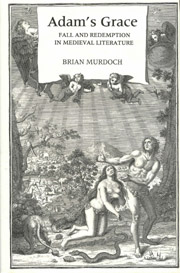Book contents
- Frontmatter
- Contents
- Ursula
- Preface
- Dedication
- Introduction: Interpreting Adam
- One After Eden: the Apocryphal Adam
- Two Written in Tablets of Stone: Adam and Gregorius
- Three Stultus et Insipiens: Adam, Parzival and the Knowledge of God
- Four Innocent Blood: Redemption and the Leper
- Five Promises to Adam: the Fall, the Redemption and Medieval Drama
- Six By the Scriptures Alone? Playing Adam in the Reformation and Beyond
- Bibliography
- Biblical Index
- General Index
Introduction: Interpreting Adam
Published online by Cambridge University Press: 12 September 2012
- Frontmatter
- Contents
- Ursula
- Preface
- Dedication
- Introduction: Interpreting Adam
- One After Eden: the Apocryphal Adam
- Two Written in Tablets of Stone: Adam and Gregorius
- Three Stultus et Insipiens: Adam, Parzival and the Knowledge of God
- Four Innocent Blood: Redemption and the Leper
- Five Promises to Adam: the Fall, the Redemption and Medieval Drama
- Six By the Scriptures Alone? Playing Adam in the Reformation and Beyond
- Bibliography
- Biblical Index
- General Index
Summary
IT IS APPROPRIATE to begin any work which centres upon Adam and Eve with ra comment by Milton, although this is not from Paradise Lost, but from his essay on education:
The end then of learning is to repair the ruins of our first parents by regaining to know God aright … But because our understanding cannot in this body found itself but on sensible things, as by orderly conning over the visible and inferior creature, the same method is necessarily to be followed in all discreet teaching. …I deem it to be an old error of universities, not yet well recovered from the scholastic grossness of barbarous ages, that instead of beginning with arts most easy (and those be such as are most obvious to the sense), they present their young unmatriculated novices, at first coming, with the most intellective abstractions of logic and metaphysics …
Milton probably did not foresee the age of popular learning, but his point remains. The easy arts, most obvious to the sense, are the best way of getting across the education designed to repair the Fall of Man. The theme of these chapters is the interpretation of theology through literature in the representation of the story of Adam and Eve and especially of its soteriological implications. Although the distinction is not an easy one, a literary work, rather than a specifically theological one, may use interpretations of the Bible or even theological arguments, but it will in doing so treat them pragmatically, and simplify them for the use of the individual reader or observer.
- Type
- Chapter
- Information
- Adam's GraceFall and Redemption in Medieval Literature, pp. 1 - 20Publisher: Boydell & BrewerPrint publication year: 2000



